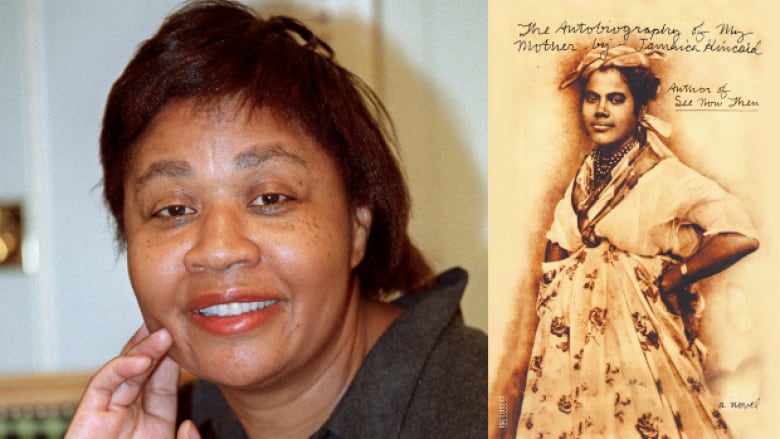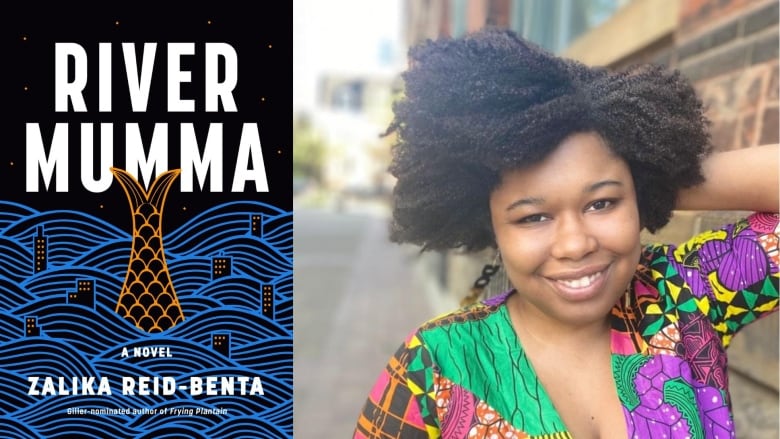The Next Chapter columnist Donna Bailey Nurse, a Toronto-based writer and literary critic is a longtime champion of Black women writers.
She stopped by The Next Chapter to recommend two novels that compliment each other, one older and one recent: Jamaica Kincaid’s The Autobiography of My Mother and Zalika Reid-Benta’s River Mumma.
“The reason that I’m thinking that this book [River Mumma] is similar to The Autobiography of My Mother is the figure of the river deity,” she told The Next Chapter‘s Ryan B. Patrick.
“Although Jamaica Kincaid is Antiguan and Zalika Reid-Benta is of Jamaican heritage, it’s the same sort of mythological figure.”
The Next Chapter13:25Tales of a river deity with Donna Bailey Nurse
Featured VideoThe Next Chapter columnist Donna Bailey Nurse recommends two works from different generations with Ryan B. Patrick: Jamaica Kincaid’s classic novel The Autobiography of My Mother and Zalika Reid-Benta’s new novel River Mumma.
Learn more about why Nurse recommends these books below.

“The Autobiography of My Mother is about her mother, Xuela Claudette Richardson. But of course it’s a novel because she can’t know everything about her mother.
“This book in particular has become foundational for me as the story of how a Black woman in this world can come to know themselves and love themselves. That is at the heart of quite a lot of black women’s writing, and with Jamaica Kincaid, it was almost like a step-by-step. The character in the novel, Xuela, knows that she needs to figure out who she is, and from a young child, she sets about doing this.
[Kincaid] wants to alert us to the fact that we are often choosing to ignore our roots and to embrace and accept the colonizers’ idea of spirituality, values, culture.– Donna Bailey Nurse
“[Kincaid] is one of those people who wants to remind us, as Caribbean people, of our African roots or she just wants to alert us to the fact that we are often choosing to ignore our roots and to embrace and accept the colonizers’ idea of spirituality, values, culture. And that’s something that doesn’t always go over well with a lot of Caribbean readers because she’s just that kind of honest person that irks people.
“In this particular book, there’s a scene that for me is emblematic of that issue. Xuela is a young school girl. She’s walking home from school with her friends, and they’re walking by the river, and they look in the river and they see this beautiful river goddess or apparitions. And she’s so beautiful, glistening, dark skinned, beautiful hair, like a mermaid, and they recognize it as some sort of deity.
“And one of her friends, the little boy, says, ‘I want to go there closer and see her.’ And they’re like, ‘No, don’t go.’ And he’s like, ‘No, I’m going to swim out to see her.’ But as it is with these deities in it, you can’t get too close. So he swam and swam. And they all watched him swim and swim, and he could just never reach her, even though she wasn’t that far. And then he sank beneath the surface and was never seen again.
“And what happens is that the children start to say, ‘We didn’t see that. We never saw that apparition.’ They didn’t believe with their own eyes, what they saw, a spirit from their own African belief system. But the character Xuela says, ‘I believe I saw it then. And I still believe now that I saw that.’ So that’s her line in the sand. ‘I believe. I’m connected to that. I’m not giving up my beliefs.'”
Jamaica Kincaid is a Caribbean American writer. She is known for her evocative portrayals of family relationships and her native Antigua. She teaches in the English, African and African American Studies department at Harvard University. Her other novels include Lucy, See Now Then and Mr. Potter.
Writers and Company53:47Jamaica Kincaid on family, place and the beauty of language
Featured VideoFrom novels such as Annie John and Lucy, to her notable nonfiction, Jamaica Kincaid’s work is highly autobiographical, chronicling everything from her childhood in Antigua to her brother’s untimely death from AIDS. Inspired by the life of her father, Kincaid’s 2002 novel Mr. Potter tells the story of an illiterate taxi driver living in Antigua. Jamaica Kincaid spoke to Eleanor Wachtel in Toronto in 2002. This episode originally aired on September 22, 2002.

“Zalika Reid-Benta writes about the heroine named Alicia. She’s 26 years old. She had a tremendous education, which she paid a lot for. She was considered probably the most promising student with a promising future as she studied, as well, in New York. But here she is now, back in Toronto, working retail.
“And so she’s so disappointed that her dreams have not manifested. And a lot of people can identify with this. She’s really feeling lost.
A lot of people can identify with this. She’s really feeling lost.– Donna Bailey Nurse
“She goes out to this Christmas or New Year’s party or something and she starts to walk home. And as she’s walking home through a park near the Humber River, she feels this oddness in the atmosphere and she feels Humber River calling her and she’s freaked out. But she still goes towards the river.
“When she gets to the Humber River she sees this beautiful goddess, gorgeous Black mermaid, who she recognizes from stories she heard from her youth, as River Mumma. And so River Mama actually drags her into the river, takes her back to her past for a brief vision of her ancestors. Alicia recognizes these women and then whips her back on to the banks of the Humber River. And what River Mumma needs for Alicia to do, she has a task for her.
“She needs Alicia to find her missing gold comb for her hair. And that is where the magic comes in.”
Reid-Benta is a Toronto-based author who explores race, identity and culture through the lens of second-generation Caribbean Canadians in her work. The Columbia MFA graduate’s debut novel Frying Plantain, a series of interconnected stories featuring a young Black female protagonist in a west end Toronto neighbourhood, was on the 2019 Scotiabank Giller Prize longlist.
CBC Books named Reid-Benta a writer to watch in 2019 and she served as jury chair for the 2021 Scotiabank Giller Prize.
Donna Bailey Nurse’s comments have been edited for length and clarity.


